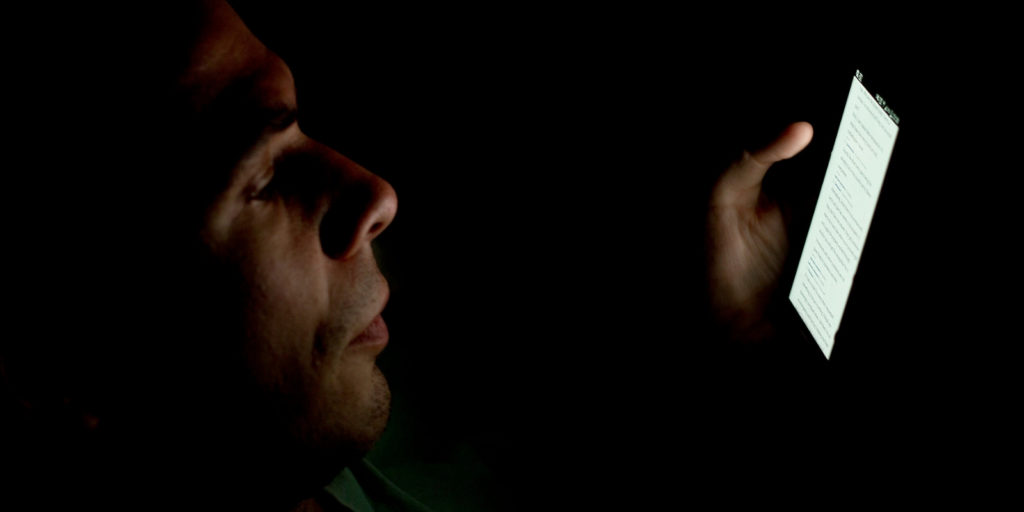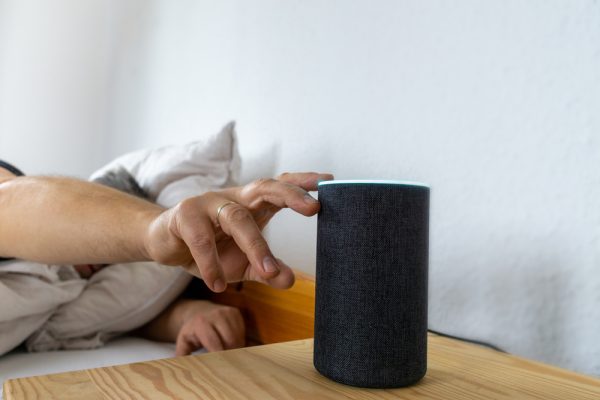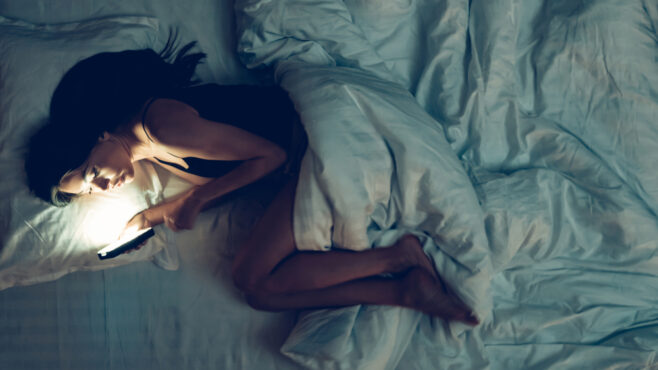Technology is ever growing, and it shows no sign of slowing down.
There are many smartphones, smart TV’s and iPads now that have the power to consume time and deprive us of sleep – the one thing our body and brains (most importantly) need in order to function properly.
With the latest in technology being released every few months, and immediately becoming a trend, it means everyone, and we mean everyone, has to try it to see what the fuss is about. While it’s enjoyable to look things up on the internet and watch your favourite show because you missed the final episode of Games of Thrones, sleep specialists are able to see a very clear and visible link between sleep and too much screen time.
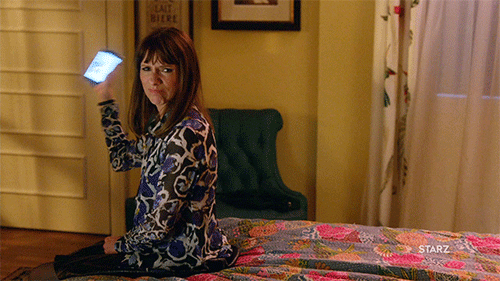
The stereotypical judgement is that of younger generations spend more time with technology because they grew up with it, and although that is a contributing factor and remains true, adults spend just as much time, if not more on media devices! It’s clear that the future is headed towards a technological advanced one, which has its advantages and disadvantages.
How does too much screen time lead to sleep deprivation?
Light emissions – The brain creates a hormone named melatonin, this regulates a person’s sleep and wake cycles. This, however, can be disrupted with too much light emitted from screens. This leads to the brain thinking the body is not ready for sleep and rest. Essentially, our body is just an internal clock – why do you think we suffer from jet lag when we’re on our travels? Because the body isn’t used to the new time zones!
Devices such as TV’s, phones and video games emit a “blue light” – it isn’t technically a blue light that is a short wavelength light, quite similar to the light we experience and are exposed to throughout the day. Because of the blue light, the brain receives a signal from the light fooling it into thinking it’s still daytime, despite the fact it’s dark outside and it’s bedtime! Too much light emission can also increase alertness, which makes it even more difficult for you to try and get some rest when you finally do put the phone down and hit the hay.
Engagement – By engaging the brain in exciting or productive screen activities, it has the ability to trigger hormonal and emotional responses such as adrenaline. This again, ultimately reduces the ability to not only fall asleep, but to stay asleep too.
How often do you use your mobile phone or tablet before you try and drift off to sleep? A
study reveals that increase amounts of screen time is associated with more insomnia symptoms and shorter sleep duration. There are ways to reduce screen time consumption and guess what? It all starts with you, so you can start to have more blissful sleeps and get your technology addiction under control.
Avoiding Screen Time & Getting More Sleep
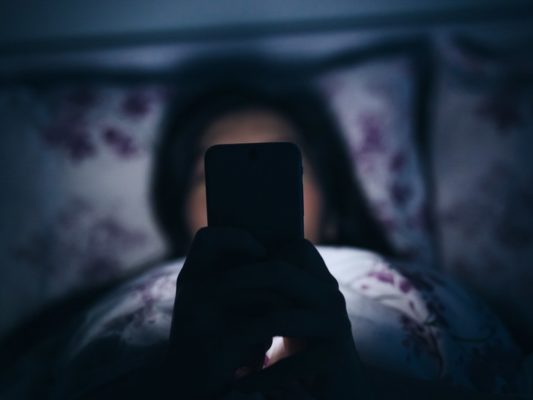 Set your media devices their own bed time
Set your media devices their own bed time – It’s most effective if you switch off devices 1-2 hours before you head to bed. By getting into a routine of not using any devices, it helps you prepare for sleep better.
Choose an alternative – This is especially helpful just before you sleep. Leave your phone, tablet, switch off the TV. Reading is a popular substitute and enhances sleep and reduces insomnia! A study conducted in 2009 revealed this, and if that’s not enough, the study also showed that just 6 minutes of reading can reduce stress by 68%!
Reduce the screen brightness – If you’re not one to be too detached from your phone, turning the brightness down can help a great deal. With iPhone's you can decide whether or not you’d like ‘night shift’ on. This feature automatically shifts the colours of your display to the warmer end of the colour spectrum when it gets dark.
Here’s how to set this up - Settings > Display & Brightness > Night Shift > Schedule Times
Limit your non work screen time – Many of us can’t avoid using devices in our working day, especially if you’re in the digital or creative world. We can limit our non-work screen time, though. This means no checking work emails or using your laptop to finish off some bits you were working on. By making these small changes, they make a great difference.
Invest in another hobby – Boredom leads us to surf the web and then get too invested, so we then find it hard to get off. Social media and google do kill time, but you could be doing something more productive that you thoroughly enjoy. Going for walks, exercising, painting and other activities are accessible and reduce your overall screen time in the day. We have a few
exercise tips for a better night’s sleep if you’re interested!
If you value your sleep and your health, be sure to try out a few of our alternatives as a way to reduce your screen time. By making small changes with the way we use and interact with technology, the better balance we have, especially with sleep!
 The stereotypical judgement is that of younger generations spend more time with technology because they grew up with it, and although that is a contributing factor and remains true, adults spend just as much time, if not more on media devices! It’s clear that the future is headed towards a technological advanced one, which has its advantages and disadvantages.
The stereotypical judgement is that of younger generations spend more time with technology because they grew up with it, and although that is a contributing factor and remains true, adults spend just as much time, if not more on media devices! It’s clear that the future is headed towards a technological advanced one, which has its advantages and disadvantages.
 Set your media devices their own bed time – It’s most effective if you switch off devices 1-2 hours before you head to bed. By getting into a routine of not using any devices, it helps you prepare for sleep better.
Choose an alternative – This is especially helpful just before you sleep. Leave your phone, tablet, switch off the TV. Reading is a popular substitute and enhances sleep and reduces insomnia! A study conducted in 2009 revealed this, and if that’s not enough, the study also showed that just 6 minutes of reading can reduce stress by 68%!
Reduce the screen brightness – If you’re not one to be too detached from your phone, turning the brightness down can help a great deal. With iPhone's you can decide whether or not you’d like ‘night shift’ on. This feature automatically shifts the colours of your display to the warmer end of the colour spectrum when it gets dark.
Here’s how to set this up - Settings > Display & Brightness > Night Shift > Schedule Times
Limit your non work screen time – Many of us can’t avoid using devices in our working day, especially if you’re in the digital or creative world. We can limit our non-work screen time, though. This means no checking work emails or using your laptop to finish off some bits you were working on. By making these small changes, they make a great difference.
Invest in another hobby – Boredom leads us to surf the web and then get too invested, so we then find it hard to get off. Social media and google do kill time, but you could be doing something more productive that you thoroughly enjoy. Going for walks, exercising, painting and other activities are accessible and reduce your overall screen time in the day. We have a few exercise tips for a better night’s sleep if you’re interested!
If you value your sleep and your health, be sure to try out a few of our alternatives as a way to reduce your screen time. By making small changes with the way we use and interact with technology, the better balance we have, especially with sleep!
Set your media devices their own bed time – It’s most effective if you switch off devices 1-2 hours before you head to bed. By getting into a routine of not using any devices, it helps you prepare for sleep better.
Choose an alternative – This is especially helpful just before you sleep. Leave your phone, tablet, switch off the TV. Reading is a popular substitute and enhances sleep and reduces insomnia! A study conducted in 2009 revealed this, and if that’s not enough, the study also showed that just 6 minutes of reading can reduce stress by 68%!
Reduce the screen brightness – If you’re not one to be too detached from your phone, turning the brightness down can help a great deal. With iPhone's you can decide whether or not you’d like ‘night shift’ on. This feature automatically shifts the colours of your display to the warmer end of the colour spectrum when it gets dark.
Here’s how to set this up - Settings > Display & Brightness > Night Shift > Schedule Times
Limit your non work screen time – Many of us can’t avoid using devices in our working day, especially if you’re in the digital or creative world. We can limit our non-work screen time, though. This means no checking work emails or using your laptop to finish off some bits you were working on. By making these small changes, they make a great difference.
Invest in another hobby – Boredom leads us to surf the web and then get too invested, so we then find it hard to get off. Social media and google do kill time, but you could be doing something more productive that you thoroughly enjoy. Going for walks, exercising, painting and other activities are accessible and reduce your overall screen time in the day. We have a few exercise tips for a better night’s sleep if you’re interested!
If you value your sleep and your health, be sure to try out a few of our alternatives as a way to reduce your screen time. By making small changes with the way we use and interact with technology, the better balance we have, especially with sleep!